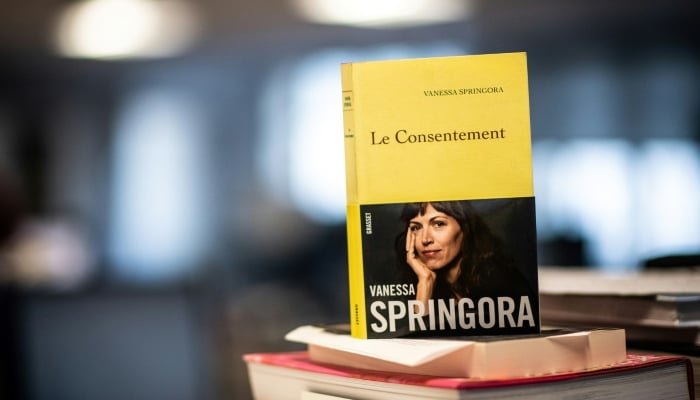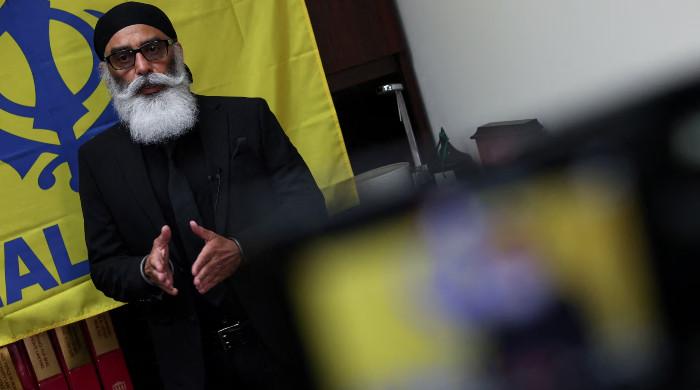Underage rape probe opened into French author Gabriel Matzneff
Paris prosecutor Remy Heitz said the inquiry would focus on 'rapes committed against a minor' aged under 15
January 03, 2020

PARIS: Prosecutors on Friday opened a rape investigation into the author Gabriel Matzneff, a day after the publication of a book detailing his sexual relationship with a girl of 14 over three decades ago.
The case has attracted huge interest in France, which is only now beginning to scrutinise attitudes after decades of what is seen by some as an overly permissive attitude towards sexual exploitation of women and paedophilia.
The probe was launched after an examination of the book, Le Consentement (Consent), published on Thursday, where author Vanessa Springora describes a sexual relationship she had with Matzneff in the mid-1980s when he was 36 years her senior, Paris prosecutor Remy Heitz said in a statement.
Related: Islamic scholar Tariq Ramadan accused of taking part in gang raping journalist
Heitz said the inquiry would focus on "rapes committed against a minor" aged under 15.
In Consent, Springora, 47, now a leading publisher, describes how Matzneff seduced her at the age of 14 and how this left lasting scars.
In the mid-1970s, he published a notorious essay called "Those Less than 16"
Matzneff, an essay writer long admired by some in French literary circles, never made any secret of his preference for sex with adolescent girls and boys.
In the mid-1970s, he published a notorious essay called "Les Moins de Seize Ans" ("Those Less than 16").
'All other victims'
Springora had indicated she did not intend to bring a criminal complaint against Matzneff. But the Paris prosecutors used their power to open an investigation of their own accord.
Read more: French theatre director quits after rape claim
Heitz said that beyond the events described by Springora, the investigation "will work to identify all other eventual victims who could have been subjected to crimes of the same nature in France or abroad".
In France, it is against the law to have a sexual relationship with anyone under the age of 15.
Andréa Bescond on December 27 slammed French journalist Bernard Pivot, 84, for defending criminal behaviour and saying "in the 70s and 80s, literature came before morals".
It is possible that investigations into Springora's evidence could be restricted by the statute of limitations, which in 2018 was extended to 30 from 20 years for this kind of crime but is not retroactive.
The book comes in the age of #MeToo as France wrestles with a series of accusations by women who say they were exploited by men who often held positions of power.

In one of the most prominent recent cases, French actress Adele Haenel accused film director Christophe Ruggia of constantly harassing her from the age of 12 to 15. She has since filed a complaint against him.
And the controversy has intensified around French-Polish film director Roman Polanski, a fugitive from US justice since 1978 when he admitted to statutory rape of a 13 year-old, after he brought out his new film, An Officer and a Spy.
"No, this is not me, this is not what we experienced together and you know it," said the writer
Interestingly, actress and dancer Andréa Bescond on December 27 slammed French journalist Bernard Pivot, 84, for defending criminal behaviour and saying "in the 70s and 80s, literature came before morals".
Bescond responded by saying: "We were passive accomplices, without any moral, we were the products of a sad time, we should have reacted."
'Not what we experienced'
Matzneff has denied any wrongdoing and in a lengthy statement sent to the L'Express magazine claimed that there had been an "exceptional love" between him and Springora, and that he did not "deserve the ugly portrait" that had been painted of him.
"No, this is not me, this is not what we experienced together and you know it," said the writer, now 83, denouncing a book that he says tries to portray him as "a pervert, a manipulator and a predator".
Read more: #MeToo and the worldwide reckoning it brought in 2017
In 2013, Matzneff was awarded the Renaudot prize for his essays on international affairs and philosophy, an award one member of the jury has now conceded was a mistake.
"Aged 14, you are not supposed to have a 50-year-old man waiting for you when you leave school, you are not supposed to live in a hotel with him, or find yourself in his bed … when you should be having a snack."
"It is clear that he would not have got the prize for one of his intimate journals," jury member Frederic Beigbeder told the Parisien daily. "This prize was a blunder."
Also read: Helen Mirren praises #MeToo, young women for 'taking control'
Springora, in her book, writes: "Aged 14, you are not supposed to have a 50-year-old man waiting for you when you leave school, you are not supposed to live in a hotel with him, or find yourself in his bed … when you should be having a snack."
Separately, journalist Lauren Collins shared a report that stated Matzneff has been receiving public aid from a fund for artists facing financial challenges.
"Pedophile writer Gabriel Matzneff has been getting thousands of dollars a year from a state fund for artists in financial difficulty," Collins wrote.
Ahead of the book's publication, French ministers rounded on Matzneff, with Culture Minister Franck Riester saying "having a literary aura is not a guarantee of impunity."
Related:
France targets sexual harassment with on-the-spot fines
#ExposeYourPig: French women name and shame harassers
220,000 women sexually harassed on public transport in France









